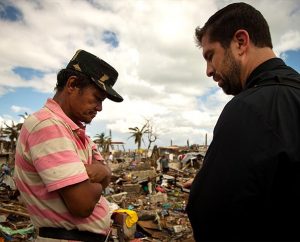By Megan K. Mertz and Paula Schlueter Ross
In Tacloban, the Philippines, the so-called “ground zero” of Typhoon Haiyan, the Rev. Ross Johnson was taken aback when a local man told him as they walked through a field of debris, “My family is underneath our feet.”

The man — distraught, somber, overwhelmed — told Johnson that 15 family members had died in the storm. “I found seven myself,” he said, “and I’m looking for the other eight.”
Johnson, co-director of LCMS Disaster Response and part of a Synod disaster team that spent several days in the Philippines to see firsthand the extent of the disaster and assist the Lutheran Church in the Philippines with its response to those who are hurting, made his comments during an 11-minute phone interview from the Philippines Nov. 20 on KFUO Radio (see “His Time” on kfuoam.org). In Tacloban, he saw disturbing scenes of “complete and utter destruction”: body bags lined up on the street corners, residents searching in the rubble, children begging for food.
Johnson, who was wearing his clerical collar in the typhoon-battered city, said another man approached him, wanting to talk, so they visited for half an hour.
“He told me that his best friend was with him when the storm hit, and died, and so did his brother,” the pastor told KFUO. “And he told me about what it was like going through the storm and how the water just swept him up. … And he said praise God that the storm was in the morning because at least they could see what to hold onto and what to grab, because, had it been at night, there would have been even more dead.”
Another survivor told him that, after experiencing the horror of the storm and its aftermath, everything he used to enjoy “is completely meaningless” now. That, Johnson said, brought to mind “that verse in James, where it says life is but a vapor, here today and gone tomorrow” (James 4:14).
Aid was “starting to trickle in” more than a week after the Nov. 8 typhoon roared over the countryside — churning up everything in its path and killing some 4,000 people, with 1,600 still missing — but it’s “coming in very slowly,” according to Johnson.
And even though the Lutheran church in Tacloban was flooded and looted after the storm, its pastor had to minister to others. “Every single member” of the congregation had storm damages, Johnson said, and some were living at the church. The pastor “is absolutely overwhelmed” by the never-ending needs.
“We met with him, we prayed with him, we brought rice and some essentials for him and the members to get them by,” Johnson said, and he promised that the LCMS would stand by its Philippine partners for the long haul of recovery.
The Synod sent an initial emergency grant of $100,000 to the Lutheran Church in the Philippines (LCP) within days of the storm and has offered to match up to $50,000 for donations gathered by member churches of the International Lutheran Council.
Another $100,000 grant from the LCMS to the LCP was being processed as this story was posted.
The Rev. Glenn Merritt, co-director of LCMS Disaster Response until June 30, when he retires and Johnson takes over, recommended the second $100,000 grant after doing assessments in Mahayag, where two Lutheran churches and a parsonage were destroyed. The funds will be used for food, medical supplies and shelter repair where needed.
Merritt relayed in a Nov. 18 text message from the Philippines that the team arrived “in a totally devastated area” on the southern end of Leyte the night before, after a two-hour boat ride.
He went on to describe the scene on the ground that night as “total darkness,” with “the faces of struggling, but not defeated, people peering through the gloom in the soft light of small fires and candles.”
Merritt also mentioned the lack of food and water and the limited availability of communication channels in the area more than a week after the storm tore through.
Giving financial contributions is “the most helpful thing” people can do right now, said Johnson. Aid will be distributed, he added, by the local Lutheran churches to those who need it.
Those wishing to support LCMS typhoon-relief efforts can make a gift to the LCMS Disaster Response Hurricane/Typhoon fund by visiting lcms.org/disaster.
Thrivent Financial for Lutherans and the Thrivent Foundation have committed matching funds for donations of Thrivent Choice® points through the Choice® website as well as gifts made directly to LCMS Disaster Response designated for typhoon relief. To make a gift through this matching-grant opportunity, go to lcms.org/disaster.
Because the LCMS typically receives nearly half of its annual charitable support in the months of November and December, donors are encouraged to prayerfully consider a gift to LCMS Disaster Response that is in addition to any planned year-end gift intended to help sustain the ongoing witness and mercy work of the Synod.
To make a gift in support of the church’s typhoon relief and recovery efforts:
- Visit here.
- Mail checks payable to “The Lutheran Church—Missouri Synod” (with a memo line or note designating “LCMS Disaster Relief — Typhoon”) to The Lutheran Church—Missouri Synod, P.O. Box 66861, St. Louis, MO 63166-6861.
- Call toll-free 888-930-4438 (8:10 a.m. to 4:10 p.m. Central Time, Monday through Friday).
For more information about the Synod’s disaster-response efforts, visit lcms.org/disaster on the Web.
Facebook users who “like” LCMS Disaster Response will receive regular updates on the Synod’s response to Typhoon Haiyan in partnership with the Lutheran Church in the Philippines.
Megan K. Mertz is a staff writer with LCMS Communications.




